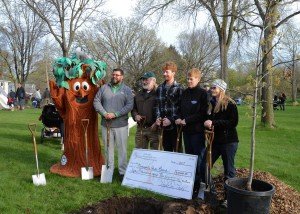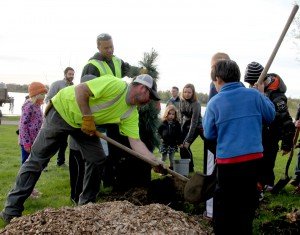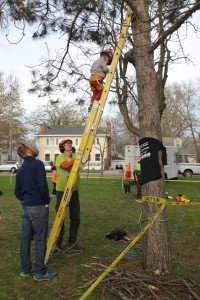To celebrate Arbor Day 2017, over 1,500 people planted 300 trees at Lake Hiawatha Park.
The location was chosen, in part, because of the highly engaged community that cares about its parks and trees.
“Having that many more trees means more water is being filtered through the root systems and a certain amount of water is being absorbed, which will create a more resilient landscape and mitigate flooding somewhat,” remarked Ryan Seibold of Friends of Lake Hiawatha, which has advocated for a cleaner lake.
“The trees are also habitat for the many species that depend on a thriving ecosystem. The trees will also create a more scenic environment that the community can enjoy and provide cooler spaces to be in the summer. When the city invests in the environment, we can expect that the community will be happier and healthier.”
The Apr. 28 event included an Arborist Show and Tell, bucket truck rides, rope-and-saddle tree climbing supervised by professional arborists, tree-sized lawn games, tree-themed obstacle course/Nature Play Zone, tree swing, pop-up library with Hennepin County Library, an exhibit about invasive species and trees, bounce house, Heritage Tree Bike Ride, and Arbor Day Fun Run.
 Photo right: People for Parks donated $15,000 to the Arbor Day event at Lake Hiawatha. “People for Parks originated in 1977 in response to the Dutch Elm Disease outbreak so being tree stewards has been an integral part of our mission for 40 years,” said People for Parks Executive Director Chriss Joyce. “People for Parks is the only grassroots non-profit that takes individual donations and turns that into funding for special projects and programs right in your backyard. We pride ourselves on bringing people from different generations, ethnic, and social economic backgrounds together to create more joy, love, and peace instead of anger, fear, and hate.” In celebration of its 40th anniversary, People for Parks has allocated $20,000 in matched funding to its mini-grant program. Every dollar donated to the mini-grant program in 2017 will be equally matched. (Photo courtesy of People for Parks)
Photo right: People for Parks donated $15,000 to the Arbor Day event at Lake Hiawatha. “People for Parks originated in 1977 in response to the Dutch Elm Disease outbreak so being tree stewards has been an integral part of our mission for 40 years,” said People for Parks Executive Director Chriss Joyce. “People for Parks is the only grassroots non-profit that takes individual donations and turns that into funding for special projects and programs right in your backyard. We pride ourselves on bringing people from different generations, ethnic, and social economic backgrounds together to create more joy, love, and peace instead of anger, fear, and hate.” In celebration of its 40th anniversary, People for Parks has allocated $20,000 in matched funding to its mini-grant program. Every dollar donated to the mini-grant program in 2017 will be equally matched. (Photo courtesy of People for Parks)
There were also musical performances by School House Rocks and Twin Town Blasting Corps (a blend of May Day Parade’s Your Community Band with members of the Brass Messengers and Arborators), food trucks and a beer garden.
All proceeds from the beer garden, coffee sales, and the Beer Run were donated to Brewing a Better Forest for Urban Forestry Outreach. With the logo, “water a tree, beer for free,” Brewing a Better Forest partners with local breweries to reward tree watering adopters with free beer tokens.
Helping sponsor the event were People for Parks, Brewing a Better Forest and Pat’s Tap. Community supporters and volunteers included Friends of Lake Hiawatha, Giving Tree Gardens, Harmony Tree, Free Forest School and Ecological Design.
 Photo left: MPRB arborists Jason Hendrickson (front) and Nicholas Hart help children and adults plant trees during the Arbor Day event at Lake Hiawatha on April 28, 2017. Over 300 trees were planted at the park that day. (Photo by Tesha M. Christensen)
Photo left: MPRB arborists Jason Hendrickson (front) and Nicholas Hart help children and adults plant trees during the Arbor Day event at Lake Hiawatha on April 28, 2017. Over 300 trees were planted at the park that day. (Photo by Tesha M. Christensen)
People for Parks donated $15,000 to the Arbor Day event at Lake Hiawatha. According to People for Parks Executive Director Chriss Joyce, trees help combat climate change, clean the air, provide oxygen, cool city streets, prevent soil erosion and water pollution, shield children from ultra-violet rays, provide food and heal. They also increase property values and business traffic.
Previous Arbor Day plantings have been funded in Logan Park, St. Anthony Park, East Phillips Park,
Pearl Park, Jordan Park, Victory Memorial Drive, Thomas Lowry Park, and Folwell Park.
Citywide, 10,000 trees will be planted by Minneapolis Parks and Recreation this year in parks and along boulevards, many replacing trees lost to Emerald Ash Borer, pointed out arborist Jason Hendrickson. Varieties planted include pine, spruce, fir, linden, Ginko, honey locust, river birch, Kentucky Coffeetree, magnolia, London Planetree, basswood, hickory, and oak.
Varieties planted include pine, spruce, fir, linden, Ginko, honey locust, river birch, Kentucky Coffeetree, magnolia, London Planetree, basswood, hickory, and oak.
Nut and fruit trees include serviceberry, three varieties of crabapple (Centennial, Dolgo, and Chestnut), Turkish filbert/hazelnut, and pine nut. The soil around the fruit trees was treated with a mycorrhizal fungi inoculum treatment thanks to Russ Henry of Giving Tree Gardens. “The tree and fungi will form a symbiotic relationship underground, and they will exchange valuable nutrients with each other—sugars, water, minerals,” said Seibold, “and fungi provide the trees some protection against disease.”
Seibold loves the cherry trees planted along the walking path.
“I immediately envisioned people picking a free and healthy snack while taking in the view of the lake and Minneapolis skyline on a nearby park bench,” said Seibold, who has proposed establishing a food forest at the Hiawatha Golf Course. “I counted about ten cherry trees, so hopefully there will be enough to make a cherry pie someday, and maybe we can make a fun community event around harvesting cherries.
“It was also really exciting to see native bees buzzing all around them as they were flowering. Our food system depends on pollinators, and growing food in our parks is an amazing opportunity to raise awareness of this important connection.”
 Photo right: Keewaydin resident Charlie Krocak, age three and a half, climbs a tree during the Arbor Day event at Lake Hiawatha Park on April 28, 2017. He was assisted by MPRB arborist John Elward. “It’s so much fun,” said his father, Brent. “The kids love climbing trees. It’s great for them to be able to do it safely.” (Photo by Tesha M. Christensen)
Photo right: Keewaydin resident Charlie Krocak, age three and a half, climbs a tree during the Arbor Day event at Lake Hiawatha Park on April 28, 2017. He was assisted by MPRB arborist John Elward. “It’s so much fun,” said his father, Brent. “The kids love climbing trees. It’s great for them to be able to do it safely.” (Photo by Tesha M. Christensen)
There is interest in planting a Three Sisters garden, an Indigenous garden technique planting corn, beans, and squash, so they work together to thrive much like the food forest concept, pointed out Seibold. There is also interest in planting Pollinator Patches that are offered free from the city of Minneapolis. On May 25, MPRB held an open house to gather input on modifying the Nokomis-Hiawatha Regional Park plan to designate urban agriculture areas.
“It would be amazing to see a continuous naturalized landscape around the whole lake with these interconnected human and wildlife ecosystems integrated throughout,” remarked Seibold.
“We’re getting closer to a healthier Lake Hiawatha.”
Comments
No comments on this item Please log in to comment by clicking here